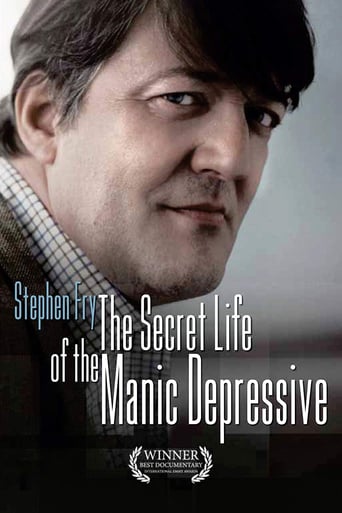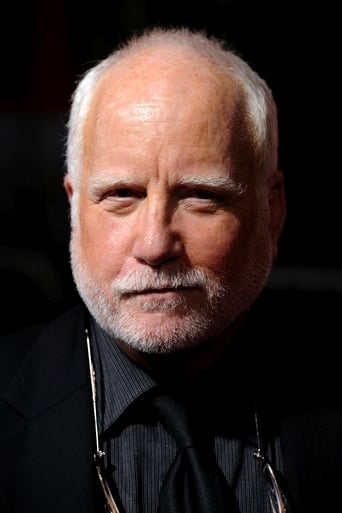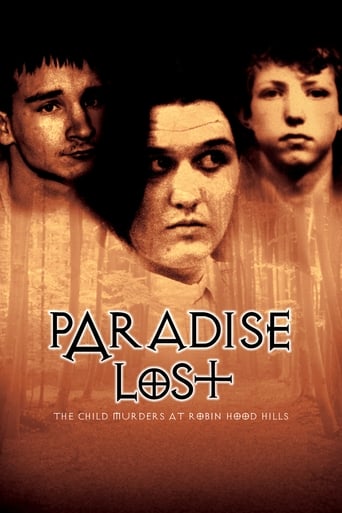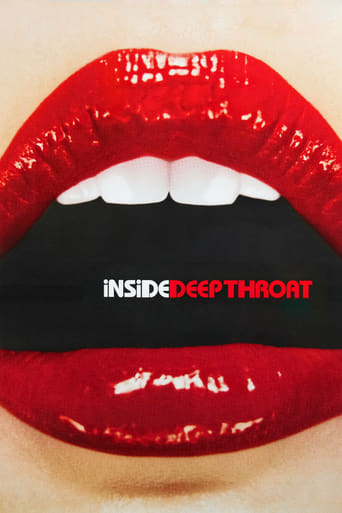

Stephen Fry: The Secret Life of the Manic Depressive (2006)
In 1995, Stephen Fry was performing in Simon Gray's West End play, "Cell Mates." After three days, he walked out of the production. Sitting in a garage, his hand on the car ignition, he contemplated suicide for two hours, before fleeing his home country for the European mainland. It wasn't until this frightening episode that Fry was diagnosed with manic depression, or bipolar disorder, a psychological condition that sees its sufferers oscillating dangerously between dizzying heights of mania and gutting troughs of prolonged depression. This 2 part documentary unfolds like a personal journey of self-discovery. Fry confronts his medical condition by consulting experts and others who have suffered the disorder (including Richard Dreyfuss and Carrie Fisher). This is a valuable documentary, and, having been acquainted only with Stephen Fry's bubbly TV persona, a fascinatingly intimate character study.
Watch Trailer
Cast


Similar titles
Reviews
It's entirely possible that sending the audience out feeling lousy was intentional
It’s not bad or unwatchable but despite the amplitude of the spectacle, the end result is underwhelming.
Let me be very fair here, this is not the best movie in my opinion. But, this movie is fun, it has purpose and is very enjoyable to watch.
Like the great film, it's made with a great deal of visible affection both in front of and behind the camera.
In this poignant two part documentary, actor and broadcaster Stephen Fry looks to unravel the stigma surrounding mental health and discover the truth behind bi-polar disorder. The themes and issues tackled in this documentary are sensitively handled throughout, and Fry makes for a compelling and articulate presenter, as the viewer follows his journey to discover the truth about his condition. The filming of the scenes is sensitive and even handed, not only with the people affected in the documentary but also with Fry's personal journey in finding out whether or not he needs to take treatment. Fry's narration is frank and sincere, the information about the illness as well as his own personal experiences are bravely and compassionately told. The documentary balances the medical and personal aspects of the illness as Fry talks to fellow sufferers as well as the doctors attempting to treat and help those affected. The documentary confidently avoids the trope of the 'tears of a clown' (the fascination with mental illness and comedians), and the issues and experiences shown in the documentary are handled with care, without being exaggerated for dramatic effect. What is presented is honest and thoughtful, with the interviews conducted by Fry being some of the best aspects of the show. His interview with fellow comedian and former psychiatric nurse Jo Brand is particularly well presented, it was clear that the views shared in this scene were heart-felt and sincere. This was due to the natural rapport that Fry succeeds in having in all of his interviews. Even when sharing his own issues he remains sincere and thoughtful throughout. The style and presentation of the documentary was successful, and successfully presented the experiences and issues without feeling overdone. The tone was consistent throughout, and the music and cinematography were mostly of a subtle and high standard. The one point at which the music felt overdone was during Fry's on screen depression episode, where the music was overly dramatic and detracted from what would otherwise have been a poignant scene. Overall however, the style and presentation was well executed, and confidently delivered the complex themes without seeming cynical or overly dramaticized. The secret life of a manic depressive presents a thoughtful and intelligent discussion of the issues surrounding bi-polar disorder and the stigma of mental health. Fry makes for a more than capable host, effortlessly conducting interviews and presenting information as well as his own personal issues. This documentary is a must-watch for anyone who has been affected by the issues involved or who has an interest in clinical psychology.
Slightly unfocused and meandering, but nonetheless very illuminating and interesting documentary on bipolar disorder, hosted with an understandably personal touch by Stephen Fry whose at his most tactful without reserving his wittiness.Some more scientific interviews would've been welcome, but the range of opinions on manic depression draw an adequate picture of that particularly complex illness.Not quite as touching as it's meant to be, but still worth two hours of your time.7 out of 10 Electro Boys
After suffering for many years with extreme swings in mood and feeling, Stephen Fry was diagnosed at age 37 as being bi-polar or suffering from being a manic depressive. Perceiving there to be a low awareness of this mental health problem, Fry investigates what it means to suffer from manic depression, meeting others who suffer from it in all walks of life from the famous to the man in the street, from the old to the young children.I have a vague memory of my mother suffering from depression at one point in her life, or at least I'm pretty sure I do. We never really talked about it but I do recall her struggling to get out of bed for months but I do remember my understanding of it all being limited. So with that in mind I though I would catch up with this two-part film when it was shown recently on BBC4 as part of a season of films to mark Stephen Fry's 50th birthday. With the personal hook of his own condition, Fry meets people who also suffer and explores what it means to them.This exploration paints a picture of a crippling mental illness that takes people from moments of "normality" to the point where suicide is an option. This range of input does provide enough information to understand the scale of the condition and does go some way to helping even the cynic come around. Even watching the film I found myself occasionally thinking that it was just a bad mood that one could just shake oneself out of, but confronted with those suffering from it, it is hard to hold this view for long. The problem is that the personal hook that makes this film accessible via Fry is also a weakness as it does heavily rely on people talking as part of quite a personal investigation. This is lifted a bit in the second part of the film where Fry continues to talk to experts about the subject. That said, the personal approach is also a strength because it does keep the people in the fore rather than the disease. This approach does help increase understanding for those of us fortunate enough to have no frame of reference for it.Overall it is not a perfect film because it does rather meander at times but it is still an interesting look at a mostly misunderstood or dismissed condition that takes a "matter-of-factly" approach and benefits from it.
In dispelling myths and opening up a dark illness to public light, Stephen Fry has shown the way forward in raising awareness for BiPolar. Mental issues and illness hasn't come all that far from the Victorian, out of sight - out of mind, asylums of the past. But with candidness and honesty we are taken on a personal journey, that was well researched to give a insight to the traumatic and chaotic lives of sufferers.The stigma surrounding mental illness is a heavy burden for those affected and their families yet we see Stephen Fry not giving a damn about others perceptions of his illness. A truly ground breaking and thought provoking documentary. A must see for anyone connected with manic depression or those looking to understand what is at times incomprehensible.













